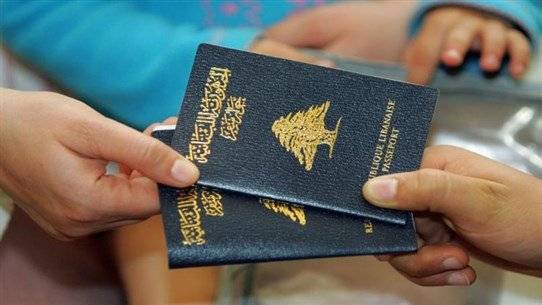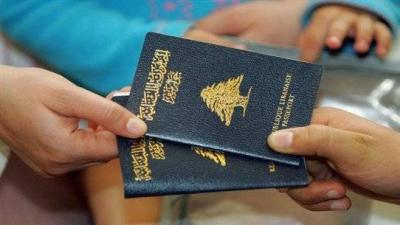Five months before the end of President Michel Aoun's term, strong reports have emerged regarding a new naturalization decree being prepared, which would grant Lebanese nationality to hundreds of individuals. It is rumored that the potential beneficiaries of this decree include Syrian and Iraqi businessmen, among others. The "Middle East" learned from informed sources that "there are offers being sought for Syrian investors interested in obtaining a Lebanese passport in exchange for substantial payments for this privilege." The sources confirmed that "specialized offices for processing transactions are currently working on completing the required documents for the naturalization decree." They indicated that these transactions "include Iraqi investors residing in Lebanon and Syrian businessmen living abroad, who have tasked these offices with obtaining the necessary papers and documents for this purpose."
The sources stated that "dozens of Syrian investors are keen on obtaining the Lebanese passport, which gives them freedom of movement amid international sanctions, particularly from the U.S. targeting the Syrian regime and its close affiliates," noting that "Lebanese nationality significantly eases their ability to carry out financial transfers abroad."
It is customary for any president's term in Lebanon to be concluded with a similar naturalization decree, which grants nationality to individuals based on the considerations deemed appropriate. President Aoun began his term with a similar decree that included around 200 individuals, most of whom were Syrians close to Bashar al-Assad's regime; it was revealed that some are listed on U.S. sanctions.
While there is a focus on the seriousness of this issue and the speeding up of its execution, sources familiar with the atmosphere at Baabda Palace clarified that the naturalization decree "is not a priority for President Michel Aoun and his team, as their current concerns revolve around important obligations, financial recovery processes, and reforms to halt the collapse." However, the sources admitted to the "Middle East" that "there are naturalization requests submitted by deserving individuals, some of whom are driven by humanitarian cases, such as those married to Lebanese citizens, but the decree is not urgently being pursued." They reminded that "it is President Aoun's constitutional right to grant citizenship to those deserving of it," asserting that "in the last year of each term, the President of the Republic issues a naturalization decree, which is a constitutional right." Examples were given showing that President Michel Sleiman "granted nationality to 7,000 individuals, President Elias Hrawi conferred it to 300,000 persons, and before him, President Amin Gemayel and others also did so."
Despite the Ministry of Interior being an obligatory passage for any similar decree, it has not received any notification regarding this matter. A source in the Ministry mentioned to the "Middle East" that the ministry "has not received any information regarding this thus far, particularly since the Civil Status Directorate is responsible for verifying this decree and the names included in it, as the signature of the Minister of Interior on the decree is mandatory."
These naturalization decrees often carry a selective nature, serving as "rewards" for influential figures and wealthy individuals rather than being granted to those who genuinely deserve them. Additionally, these decrees lack thorough study. Public policy expert Ziad Saik denied having any information about the existence of a new naturalization decree, expressing a desire for the state’s focus to shift towards saving the country from its crises. Saik lamented in a statement to the "Middle East" that "the issue of naturalization is raised based on selectiveness rather than legal and constitutional criteria," considering that "the idea of standardization has failed, leading to the collapse of both the structure and the constitution, allowing the country to be subject to whims and permitting violations, which undermines the moral public space and does not build social contracts or the common good."
He urged the new parliament to "take its role and advocate for standardization regarding naturalization decrees and others, restoring respect for the law and constitution, and moving toward a citizenship law." Ziad Saik pointed out that "individuals have obtained Lebanese citizenship for over 20 years, and they have become true Lebanese citizens, yet there are daily challenges against their nationality, with some doubting their Lebanese identity and calling for its withdrawal (referring to the challenge made by former MP Ni`matullah Abi Nasr from the Free Patriotic Movement against the naturalization decree issued in 1994, seeking to annul it)," which brings us back to the issue of standardization. He warned of a "real danger to Lebanese identity from the fundamental understanding of it, as there are those who allow for a systematic assault on this concept, contradicting its ethical and constitutional principles."




